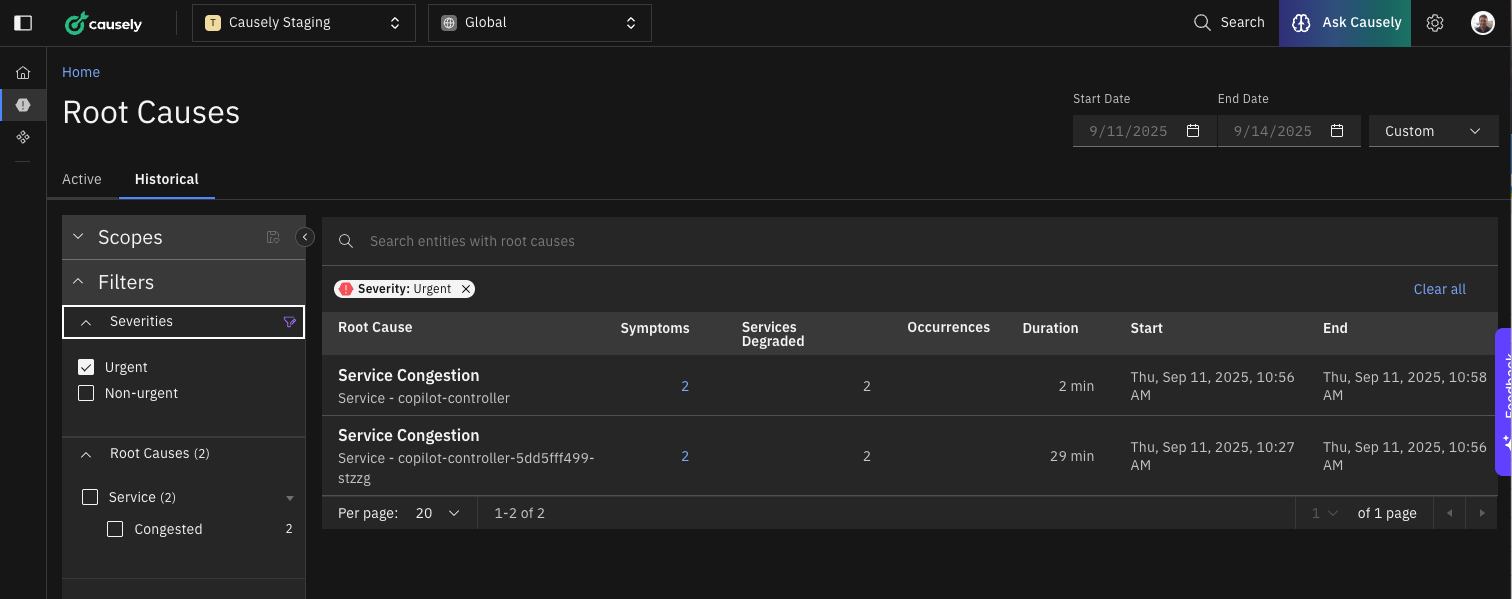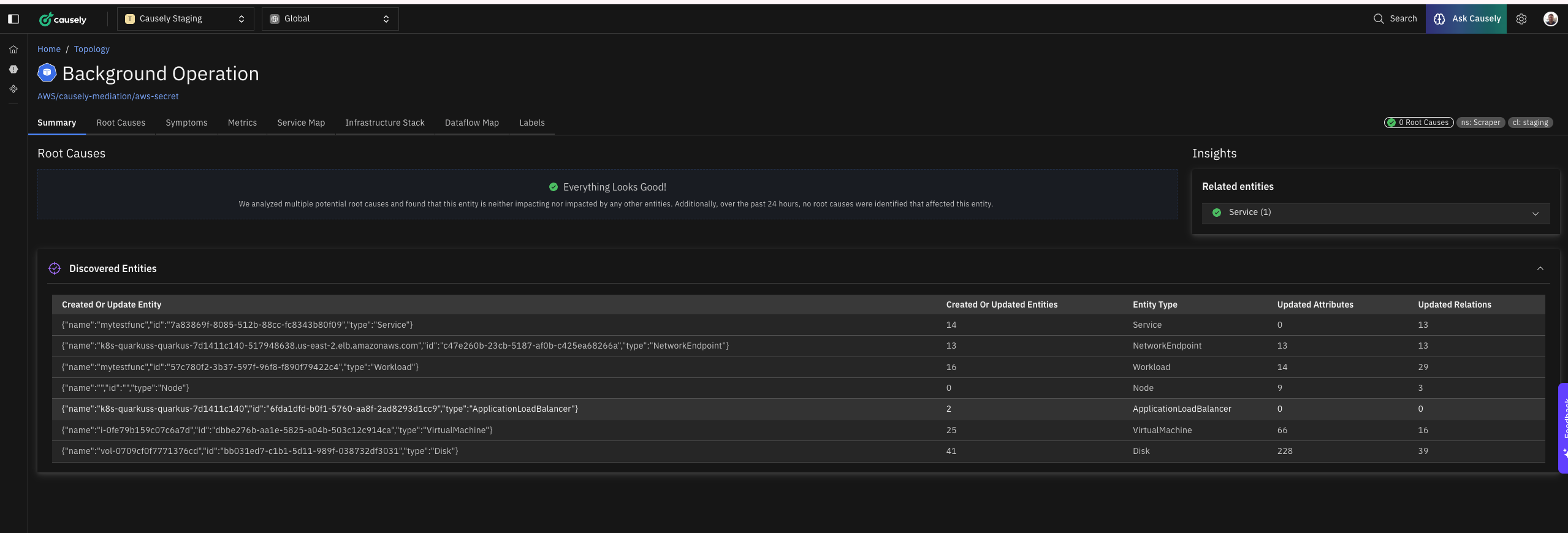v1.0.92
September 23, 2025
v1.0.92Enhanced Ask Causely with Integration and Documentation Support
Ask Causely now provides intelligent assistance across two critical areas that significantly expand its utility:
Integration Status Intelligence:
- Real-Time Integration Health: Ask about the current state of your telemetry integrations and data sources
- Configuration Validation: Get insights into integration setup and troubleshooting guidance
- Coverage Analysis: Understand which parts of your infrastructure are being monitored and identify gaps
- Performance Metrics: Query integration performance, data ingestion rates, and connection health
Documentation-Aware Assistance:
- Context-Aware Documentation: Ask Causely can now answer questions directly from Causely's extensive documentation
- Feature Guidance: Get help understanding how to use specific Causely features and capabilities
- Best Practice Recommendations: Receive expert advice on configuration, setup, and optimization
- Troubleshooting Support: Access step-by-step guidance for common issues and advanced scenarios
This enhancement makes Ask Causely your comprehensive assistant for both operational troubleshooting and platform guidance, reducing context switching and accelerating problem resolution.
Enhanced Root Cause Management
Managing and analyzing root causes becomes more powerful with new filtering and historical analysis capabilities:
Priority Filtering and Tagging:
- Priority-Based Filtering: Filter root causes by priority levels to focus on the most critical issues
- Tag-Based Organization: Use custom tags for root causes for better categorization and filtering
- Enhanced Search: Quickly find specific root causes using tag and priority filters
Historical Analysis:
- Custom Date Filters: Analyze root causes across any custom date range for historical insights
- Trend Analysis: Identify patterns and recurring issues over time
- Historical Context: Better understand how root causes have evolved and been resolved
These capabilities help teams prioritize incident response and gain insights from historical patterns.

Mediation Insights: Understanding Your Causely Setup
Causely now provides comprehensive visibility into its own operations, giving you clear insights into how your Causely deployment is working and what it's discovering in your environment:
See What Causely Knows About Your Environment:
- Discovered Entities Overview: Get a clear picture of all the services, databases, load balancers, and infrastructure components that Causely has discovered
- Discovery Progress: Track which parts of your infrastructure Causely is actively monitoring and identify any gaps in coverage
- Setup Validation: Understand whether your Causely installation is working as expected and discovering the entities you expect it to find
- Environment Coverage: See the full scope of what Causely is monitoring across your entire system
Monitor Causely's Health and Performance:
- Integration Status: Check the health of all your configured data sources and integrations
- Connection Monitoring: See which external systems (monitoring tools, databases, cloud providers) Causely is successfully connecting to
- Processing Performance: Monitor how efficiently Causely is analyzing your telemetry data and generating insights
- System Resource Usage: Track Causely's own resource consumption and performance metrics
These self-insights gives you confidence that Causely is working correctly, helps you optimize your setup, and ensures you're getting comprehensive coverage of your infrastructure.

Enhanced eBPF Instrumentation with Beyla 2.6
Causely now leverages Grafana Beyla 2.6, bringing significant improvements to automatic instrumentation capabilities:
New Beyla 2.6 Features:
- Improved MongoDB Instrumentation: Enhanced support for MongoDB monitoring and trace collection
- Advanced Service Discovery: Better automatic discovery of services and applications
- Enhanced OpenTelemetry Integration: Improved compatibility with OpenTelemetry ecosystem components
- Stability Improvements: Various fixes and enhancements for more reliable instrumentation
Enhanced Integration Capabilities:
- Configurable OpenTelemetry SDK: More flexible configuration options for telemetry collection
- Improved Metrics Collection: Enhanced metrics gathering through OpenTelemetry protocols
- Advanced Discovery Configuration: Fine-tuned discovery settings for different deployment scenarios
This upgrade ensures that Causely's automatic eBPF-based instrumentation remains at the forefront of eBPF-based observability technology.
Did you know?
Causely works with virtually any programming language because it's built on OpenTelemetry, the industry-standard observability framework. OpenTelemetry provides native instrumentation libraries for all major languages including:
- Java
- .NET
- Go
- Python
- JavaScript
- C++
- Rust
- PHP
- Ruby
- Swift
- Erlang/Elixir
- ... and many more.
Whether your applications are already instrumented with OpenTelemetry or you're just getting started, Causely can help:
- Want to get started quickly? Use Causely's automatic eBPF-based instrumentation for zero-code observability
- Already using or rolling out OpenTelemetry? Learn how to integrate with OpenTelemetry alongside your existing rollout
This flexibility means Causely can provide root cause analysis regardless of your technology stack or observability maturity.
Bug Fixes and Minor Improvements
This release includes numerous enhancements and fixes across the platform:
- Incident.io Integration: Added support for Incident.io auto-mapping and integration for enhanced workflow management
- Improved Notification System: Fixed notification ordering and enhanced support for multiple owner notifications
- Enhanced Performance: Resolved race conditions, improved queue processing, and better latency threshold calculations
- Better Visualization: Improved topology graphs with bidirectional edges and enhanced root cause naming for AWS ALB and GCP load balancers